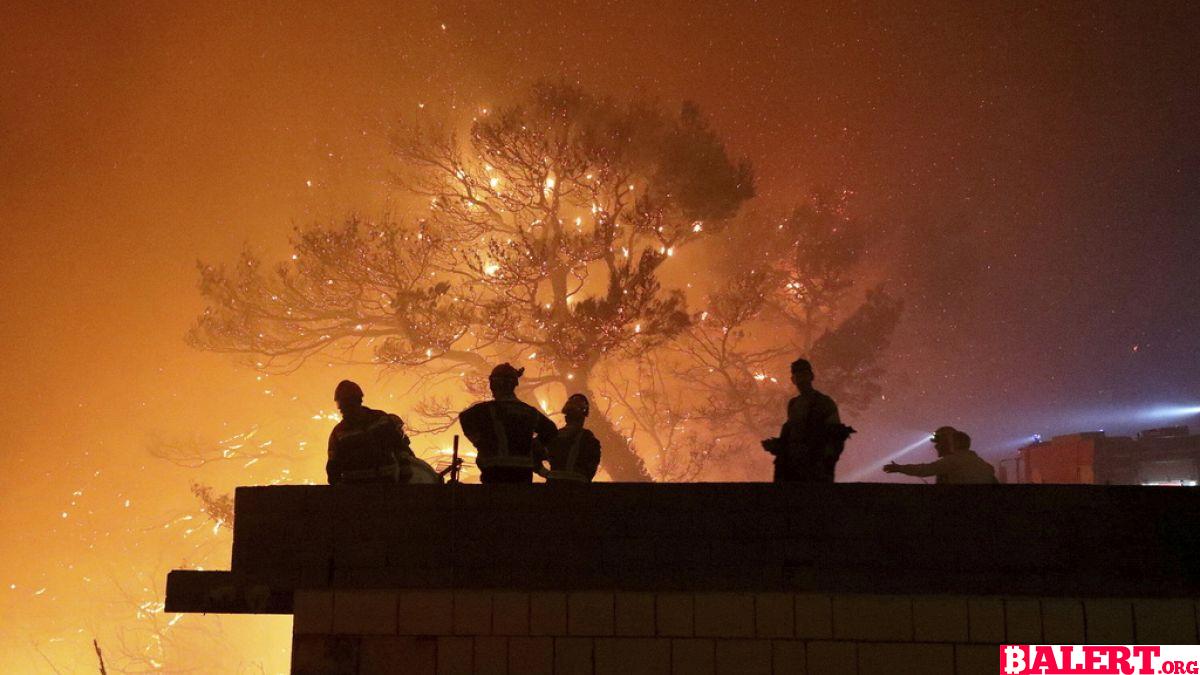World
Wildfire Risks Rise in Europe Amid Heatwave
As a heatwave grips Europe, the risk of wildfires escalates dramatically. Explore the causes, potential impacts, and safety measures being implemented to combat this growing threat to ecosystems and communities across the continent.

Wildfire Risks Intensify Amid Heatwave in Europe
The ongoing heatwave across Europe has significantly increased the threat of wildfires, particularly affecting southern regions of the continent. Countries such as Croatia, Italy, Greece, and their neighbors are grappling with rapidly spreading flames, leading to urgent responses from authorities.
In response to this escalating crisis, the European Union (EU) has activated the EU Civil Protection Mechanism, a vital framework established in 2001. This mechanism comprises three main branches and is equipped with a fleet of 28 water bomber planes and 4 helicopters, which are deployed through the collaboration of EU Member States.
To bolster firefighting efforts, the EU has earmarked an impressive €600 million for the procurement of 12 state-of-the-art water bombers. These aircraft are anticipated to be operational by the end of the decade and will be strategically distributed among six Member States, enhancing their capacity to combat wildfires effectively.
Moreover, the EU is prepared to intervene directly on the ground. “More than 500 firefighters are strategically positioned in four southern EU Member States—France, Portugal, Spain, and Greece—and can be summoned to assist local teams when necessary,” explains Balazs Ujvari, spokesperson for the European Commission. This proactive approach ensures that resources are readily available to respond to emergencies.
In addition to personnel, Member States can access satellite imagery from the Copernicus system, the EU’s comprehensive Earth observation program. This system has been activated 25 times in 2023 alone to monitor wildfire events worldwide, providing crucial data for effective management.
To initiate assistance from the EU’s mechanism, national authorities can contact the Emergency Response Coordination Centre in Brussels, which operates around the clock. Requests for aid and specific needs are then relayed to the relevant capitals. “Our goal is to respond as swiftly as possible, which can take just a few hours, sometimes slightly longer, or even just a few minutes,” adds Ujvari.
Prioritizing Prevention Over Suffering
While the responsibility for fire prevention rests primarily with the Member States, the EU took proactive steps by implementing an action plan in 2022 aimed at enhancing administrative capabilities and knowledge related to wildfire management. This plan also seeks to increase investments in preventive measures.
Furthermore, the EU is actively working to develop a standardized method for assessing national prevention systems and facilitating the exchange of best practices among the 27 Member States. This collaborative effort is vital for improving overall wildfire resilience.
According to a report from the Commission’s Joint Research Centre, wildfires devastated nearly 900,000 hectares of land within the EU in 2022. However, 2023 has proven to be even more catastrophic, witnessing the largest fire in Europe and marking one of the most severe wildfire seasons ever recorded in the Union.
The EU Civil Protection Mechanism is not limited to assisting its Member States; it extends its solidarity beyond borders. “We are committed to helping everyone in need, so any country can request assistance,” asserts Balazs Ujvari. Last year, the Union provided aid to countries such as Chile, Canada, and Tunisia, and just last month, Albania reached out for EU support.
Throughout the previous year, the Civil Protection Mechanism was activated 10 times, demonstrating its essential role in crisis response. By mid-summer this year, it had already been mobilized on five occasions, highlighting the urgent need for collective action in the face of increasing wildfire threats.
World
Dominique Pelicot Testifies in Harrowing Rape Trial
Join us as Dominique Pelicot courageously testifies in a harrowing rape trial, shedding light on the complexities of trauma and justice. Her powerful story raises crucial questions about the legal system and the importance of support for survivors.

Dominique Pelicot Takes the Stand in Shocking Rape Trial
In a courtroom drama that has captivated France and garnered international attention, Dominique Pelicot, the man at the center of a harrowing rape trial, finally addressed the court. With tears streaming down his face, he recounted how his wife had been instrumental in helping him cope with a tumultuous past marked by trauma. He revealed that he had endured a sexual assault at the tender age of nine while hospitalized, and he also witnessed a gang rape during his teenage years while working as an apprentice electrician on a construction site.
“She didn’t deserve this, I acknowledge that,” Mr. Pelicot stated, his voice barely audible as he struggled to convey his emotions. The gravity of the situation weighed heavily on him, and the courtroom fell silent, straining to catch his every word.
Now 71 years old, Mr. Pelicot faces serious allegations of drugging his wife, Gisèle Pelicot, whom he has been married to for half a century, over a span of nearly ten years. Prosecutors contend that he used drugs to render her comatose, allowing him to rape her repeatedly. Furthermore, authorities allege that he went so far as to invite numerous men into their home, facilitating a nightmarish scenario where they, too, engaged in the assault of his wife.
Overall, 51 men, including Mr. Pelicot, are on trial concurrently, primarily facing charges related to the aggravated rape of Ms. Pelicot. Among them, one individual has already pleaded guilty to similar crimes, admitting to drugging his own wife to assault her and inviting Mr. Pelicot to partake in the horrific act while she was incapacitated.
Mr. Pelicot’s unexpected testimony came after a tumultuous start to the trial. Just a week in, he was stricken with severe health issues that forced him to miss four consecutive days in court. The head judge ultimately decided to postpone proceedings, as Mr. Pelicot was diagnosed with kidney stones, a kidney infection, and prostate complications, adding yet another layer of complexity to this already harrowing case.
World
Meta Bans Russian State Media Outlets from Social Media Platforms
Explore the implications of Meta’s decision to ban Russian state media outlets from its social media platforms. Understand the impact on information dissemination and the ongoing battle against misinformation in the digital landscape.

Meta Imposes Global Ban on Russian State Media Outlets
In a significant move, Meta Platforms, Inc., the parent company of Facebook, has announced the prohibition of Russian state media outlets, including RT (Russia Today) and Rossiya Segodnya, from all its social media platforms. The decision stems from the company’s concerns regarding the deceptive strategies employed by these media organizations to execute covert influence operations across the internet.
Meta made this announcement on Monday, emphasizing that the ban will be enforced worldwide across its various platforms, such as Instagram, WhatsApp, and Threads. The rollout of this ban is expected to take place over the coming days.
Statement from Meta
A spokesperson for Meta elaborated on the decision, stating, “After careful consideration, we have expanded our ongoing enforcement actions against Russian state media outlets. As a result, Rossiya Segodnya, RT, and other affiliated entities are now banned from our applications globally due to their involvement in foreign interference activities.”
For further insights into this development, watch the video in the player above.
World
Trump Recalls Alleged Assassination Attempt While Golfing
Explore Donald Trump’s chilling recollection of an alleged assassination attempt he experienced while enjoying a round of golf. Delve into the tense moments and his reflections on safety, fame, and the unpredictability of public life.

In a recent interview on the social media platform X, Republican presidential nominee Donald Trump recounted a harrowing incident he claims to have experienced while playing golf. Trump described how, during a peaceful Sunday morning round with friends, the tranquility of the day was abruptly shattered by the sound of gunfire in the air.
“It was a beautiful day, everything was just perfect,” Trump reflected. “Then all of a sudden, we heard shots being fired—probably around four or five in total.” He went on to explain that a Secret Service agent was the first to spot the suspect, who was allegedly armed with an AK-47, a powerful assault rifle.
“The agent saw the barrel of the weapon and immediately took action, returning fire at the barrel and aiming in the direction of the bushes,” Trump detailed. “I would have loved to have sunk that last putt, but we decided it was best to leave the scene promptly.”
Trump expressed his gratitude towards the agents and a vigilant civilian who aided in tracking down the suspect, who was eventually apprehended following a high-speed chase.
Suspect Faces Multiple Federal Gun Charges
The FBI has identified the suspect as Ryan Wesley Routh, accusing him of targeting Trump during his time at the golf club in West Palm Beach, Florida. According to an FBI report, Routh had allegedly hidden among the hedges of the golf course for an astonishing 12 hours. Authorities discovered an SKS-style assault rifle, a GoPro camera, and a bag of food at the scene.
The 58-year-old Routh is now facing two serious federal gun charges. If convicted on both counts, he could face a combined maximum sentence of 20 years in prison. Notably, neither of the charges is directly related to an assassination attempt. The first charge pertains to possessing a firearm despite a prior felony conviction, which carries a potential 15-year sentence, a fine of $250,000 (€225,000), and three years of supervised release.
The second charge involves possession of a firearm with an obliterated serial number, which could result in a five-year prison term, the same financial penalties, and also three years of supervised release. As the investigation continues, additional charges could be forthcoming.
While the motive behind Routh’s actions remains unclear, his digital footprint reveals strong political affiliations, particularly concerning issues surrounding Ukraine and China. Routh consistently expressed support for Ukraine across various social media platforms, even claiming to have orchestrated a recruitment scheme for international volunteers aiming to assist Ukraine in its fight against Russia’s invasion. This behavior has been denounced by Ukrainian soldiers and members of the International Legion, who disavowed Routh’s actions and motives.
-

 Business4 months ago
Business4 months agoObituary: Dan Collins
-

 Business3 months ago
Business3 months agoThe Significance of Jackson Hole: A Central Banking Tradition
-

 Gaming5 months ago
Gaming5 months agoMore than a thousand students vowed not to work for Amazon and Google due to the Nimbus Project.
-

 World5 months ago
World5 months agoRussia and North Korea Strengthen Defense Ties
-

 Business5 months ago
Business5 months agoJump Crypto Invests $10 Million in Pro-Crypto PAC
-

 Article5 months ago
Article5 months agoCreative Design Applications Developed with Artificial Intelligence
-

 Tech2 months ago
Tech2 months agoNew Leaks and Features About the Samsung Galaxy S25 Ultra
-

 Gaming5 months ago
Gaming5 months agoThe Inspirational Success Story of Avon’s Founder Who Sold Books Door to Door














